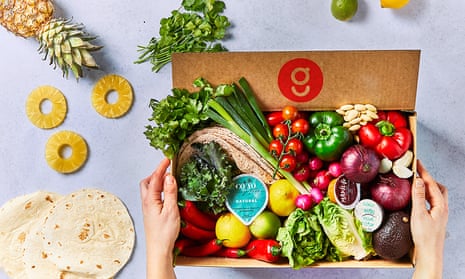Caroline Kennedy says she can’t remember life before meal kits. The weekly shop used to be a drag, and she would buy the same food – a lot of it unhealthy and much of it routinely thrown in the bin.
Now she jumps online, clicks her favourite dishes and waits for a box of fresh, measured ingredients to be delivered.
Converts like Kennedy have helped subscription recipe kits from the top three suppliers – HelloFresh, Gousto and Mindful Chef – more than double their sales in the past year. “I love it because it saves me the hassle of shopping, gets us eating healthier food, and I feel like I’m a better cook,” says Kennedy, a Surrey-based working mother of two.
Recipe boxes are sold as a convenient, healthy alternative for time-poor professionals and working parents. Weighed portions allow wannabe chefs to rustle up ambitious meals – from spicy haddock gumbo to tofu tagine.
“All I did before was repeat the same meals every week because I just didn’t have time to look through recipe books and couldn’t be bothered to think about new ideas. The children moaned at first but the variety has made them much less fussy,” she says.
Five million recipe kit meals are now ordered every month, replacing tired standbys such as beans on toast and microwave lasagne. From almost nowhere, it has become one of the fastest-growing categories of online shopping.
Price is a barrier for many – £64 for a kit that feeds a family of four over half the week is expensive, but Kennedy calculates that each meal works out at less than the cost of Big Macs and fries. She believes her family is saving money as they now shop more selectively in the supermarket and waste much less food.
Brighton-based father of two Nigel Cooper is another recipe-box evangelist. “It has genuinely been life changing,” he says. “We were buying loads of stuff in the week and then getting to the weekend and realising we hadn’t cooked half of it.”
Cooper says he didn’t buy fish in the past because he was unsure how to cook it. “Now we have it twice a week,” he says. “There’s loads of meals that I would never have thought to try.”
Mindful Chef’s 30-year-old co- founder Myles Hopper says he and two schoolfriends came up with the idea after seeing the huge success of recipe kits in America, where they are a billion-dollar market. Hopper launched in London but says customers outside the M25 now fuel more than half the orders. It’s a similar trend at Gousto, where 80% of customers come from outside the capital. Set up six years ago, Gousto creates 40 recipes a week, from 10-minute steamed miso fish to more involved dishes such as duck with potato parsnip gratin.

“People want to know what goes into their food, where it’s from, how it’s sourced – they don’t want to worry about weird additives,” says Timo Boldt, the company’s founder.
Sourcing fish from Scotland and sausages and potatoes from Lincolnshire, Boldt says that over the last two years farmers and suppliers have been keener to work with smaller independent companies such as his, and not just the big supermarkets.
Perhaps inevitably, Britain’s leading grocers are trying to capitalise on the boom. Morrisons and Waitrose have launched their own recipe kits: Eat Fresh and Cook Well. But Mindful Chef’s Hopper believes families will be more sceptical about buying from the big brands. “They favour smaller brands that have a purpose,” he says.
There is an issue, though, with plastic waste. Recipe boxes often include plastic tubs for tiny amounts of ingredients such as soy sauce, tomato paste and honey. Doesn’t that take the shine off their “no waste” halo? “It’s about finding a compostable solution – the difficulty is in keeping the food fresh,” Hopper says. Boldt agrees that the challenge is huge but says his firm pledges to reduce its plastic by 50% this year in an effort to to be “the greenest way to eat dinner”.
